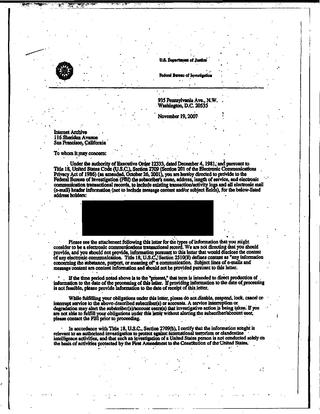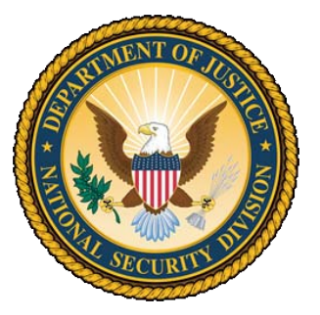
The USA PATRIOT Act was a landmark Act of the United States Congress, signed into law by President George W. Bush. The formal name of the statute is the Uniting and Strengthening America by Providing Appropriate Tools Required to Intercept and Obstruct Terrorism Act of 2001, and the commonly used short name is a contrived acronym that is embedded in the name set forth in the statute.
American Civil Liberties Union v. Ashcroft is a lawsuit filed on behalf of a formerly unknown Internet Service Provider (ISP) owner by the American Civil Liberties Union against the U.S. federal government.
Brandon Mayfield is a Muslim-American convert in Washington County, Oregon, who was wrongfully detained in connection with the 2004 Madrid train bombings on the basis of a faulty fingerprint match. On May 6, 2004, the FBI arrested Mayfield as a material witness in connection with the Madrid attacks, and held him for two weeks, before releasing him with a public apology following Spanish authorities identifying another suspect. A United States DOJ internal review later acknowledged serious errors in the FBI investigation. Ensuing lawsuits resulted in a $2 million settlement. An initial ruling declared some provisions of the USA PATRIOT Act unconstitutional, but the United States government appealed, and the ruling was overturned at the Ninth Circuit level on technical standing grounds.

The Foreign Intelligence Surveillance Act of 1978 is a United States federal law that establishes procedures for the surveillance and collection of foreign intelligence on domestic soil.
Title I: Enhancing Domestic Security against Terrorism is the first of ten titles which comprise the USA PATRIOT Act, an anti-terrorism bill passed in the United States after the September 11, 2001 attacks. Title I contains six sections, which, in turn, establish a fund for counterterrorist actions, condemn discrimination against Arab and Muslim Americans, increase funding for the FBI's Technical Support Center, allow for military assistance in some situations involving weapons of mass destruction when requested by the United States Attorney General, expanded the National Electronic Crime Task Force, and expanded the President's authority and abilities in case of terrorism.
The USA PATRIOT Act was passed by the United States Congress in 2001 as a response to the September 11, 2001 attacks. It has ten titles, each containing numerous sections. Title II: Enhanced Surveillance Procedures granted increased powers of surveillance to various government agencies and bodies. This title has 25 sections, with one of the sections containing a sunset clause which sets an expiration date, December 31, 2005, for most of the title's provisions. This was extended twice: on December 22, 2005 the sunset clause expiration date was extended to February 3, 2006 and on February 2 of the same year it was again extended, this time to March 10.

The following are controversial invocations of the USA PATRIOT Act. The stated purpose of the Act is to "deter and punish terrorist acts in the United States and around the world, to enhance law enforcement investigatory tools, and for other purposes." One criticism of the Act is that "other purposes" often includes the detection and prosecution of non-terrorist alleged future crimes.
Title VI: Providing for victims of terrorism, public safety officers and their families is the sixth of ten titles which comprise the USA PATRIOT Act, an anti-terrorism bill passed in the United States after the September 11, 2001 attacks. It provides aid to the families of Public Safety Officers who were injured or killed in terrorist attacks, and amends the Victims of Crime Act of 1984.
The USA PATRIOT Act was passed by the United States Congress in 2001 as a response to the September 11, 2001 attacks. It has ten titles, each containing numerous sections. Title IV: Protecting the Border aims to prevent terrorism in the USA through immigration regulations. The provisions of the title generally increase the difficulty of entering the country for those known to have, or suspected of having, terrorist intent.
Title IX: Improved Intelligence is the ninth of ten titles which comprise the USA PATRIOT Act, an anti-terrorism bill passed in the United States after the September 11, 2001 attacks. It amends the National Security Act of 1947 to require the Director of Central Intelligence (DCI) to establish requirements and priorities for foreign intelligence collected under the Foreign Intelligence Surveillance Act of 1978 and to provide assistance to the United States Attorney General to ensure that information derived from electronic surveillance or physical searches is disseminated for efficient and effective foreign intelligence purposes.

The following is a section summary of the USA PATRIOT Act, Title II. The USA PATRIOT Act was passed by the United States Congress in 2001 as a response to the September 11, 2001 attacks. Title II: Enhanced Surveillance Procedures gave increased powers of surveillance to various government agencies and bodies. This title has 25 sections, with one of the sections containing a sunset clause which sets an expiration date, 31 December 2005, for most of the title's provisions. On 22 December 2005, the sunset clause expiration date was extended to 3 February 2006.
The American Bar Association passed resolutions on the USA PATRIOT Act that asked the U.S. Government "to conduct a thorough review of the implementation of the powers granted to the Executive Branch under the Act before considering legislation that would extend or further expand such powers ...." and "to conduct regular and timely oversight including public hearings ... to ensure that government investigations undertaken pursuant to the Foreign Intelligence Surveillance Act ... do not violate the First, Fourth, and Fifth Amendments of the Constitution ...." They also set up a website to discuss issues in relation to the Act, and thus the Patriot Debates were born, where various people debated specific sections.

A national security letter (NSL) is an administrative subpoena issued by the United States government to gather information for national security purposes. NSLs do not require prior approval from a judge. The Stored Communications Act, Fair Credit Reporting Act, and Right to Financial Privacy Act authorize the United States government to seek such information that is "relevant" to authorized national security investigations. By law, NSLs can request only non-content information, for example, transactional records and phone numbers dialed, but never the content of telephone calls or e-mails.
The USA PATRIOT Act was passed by the United States Congress in 2001 as a response to the September 11, 2001 attacks. It has ten titles, each containing numerous sections. Title III: International Money Laundering Abatement and Financial Anti-Terrorism Act of 2001 is actually an act of Congress in its own right as well as being a title of the USA PATRIOT Act, and is intended to facilitate the prevention, detection and prosecution of international money laundering and the financing of terrorism. The title's sections primarily amend portions of the Money Laundering Control Act of 1986 and the Bank Secrecy Act of 1970.

The United States Department of Justice National Security Division (NSD) handles national security functions of the department. Created by the 2005 USA PATRIOT Act reauthorization, the division consolidated all of the department's national security and intelligence functions into a single division. The division is headed by the Assistant Attorney General for National Security.
The USA PATRIOT Act was passed by the United States Congress in 2001 as a response to the September 11 attacks in 2001. It has ten titles, with the third title written to prevent, detect, and prosecute international money laundering and the financing of terrorism.

The history of the USA PATRIOT Act involved many parties who opposed and supported the legislation, which was proposed, enacted and signed into law 45 days after the September 11 terrorist attacks in 2001. The USA PATRIOT Act, though approved by large majorities in the U.S. Senate and House of Representative, was controversial, and parts of the law were invalidated or modified by successful legal challenges over constitutional infringements to civil liberties. The Act had several sunset provisions, most reauthorized by the USA PATRIOT Improvement and Reauthorization Act of 2005 and the USA PATRIOT Act Additional Reauthorizing Amendments Act. Both reauthorizations incorporated amendments to the original USA PATRIOT Act, and other federal laws.

The FISA Amendments Act of 2008, also called the FAA and Foreign Intelligence Surveillance Act of 1978 Amendments Act of 2008, is an Act of Congress that amended the Foreign Intelligence Surveillance Act. It has been used as the legal basis for surveillance programs disclosed by Edward Snowden in 2013, including PRISM.

The USA Freedom Act is a U.S. law enacted on June 2, 2015, that restored and modified several provisions of the Patriot Act, which had expired the day before. The act imposes some new limits on the bulk collection of telecommunication metadata on U.S. citizens by American intelligence agencies, including the National Security Agency. It also restores authorization for roving wiretaps and tracking lone wolf terrorists. The title of the act is a ten-letter backronym that stands for Uniting and Strengthening America by Fulfilling Rights and Ensuring Effective Discipline Over Monitoring Act of 2015.
In Re Electronic Privacy Information Center, 134 S.Ct. 638 (2013), was a direct petition to the Supreme Court of the United States regarding the National Security Agency's (NSA) telephony metadata collection program. On July 8, 2013, the Electronic Privacy Information Center (EPIC) filed a petition for a writ of mandamus and prohibition, or a writ of certiorari, to vacate an order of the Foreign Intelligence Surveillance Court (FISC) in which the court compelled Verizon to produce telephony metadata records from all of its subscribers' calls and deliver those records to the NSA. On November 18, 2013, the Supreme Court denied EPIC's petition.




